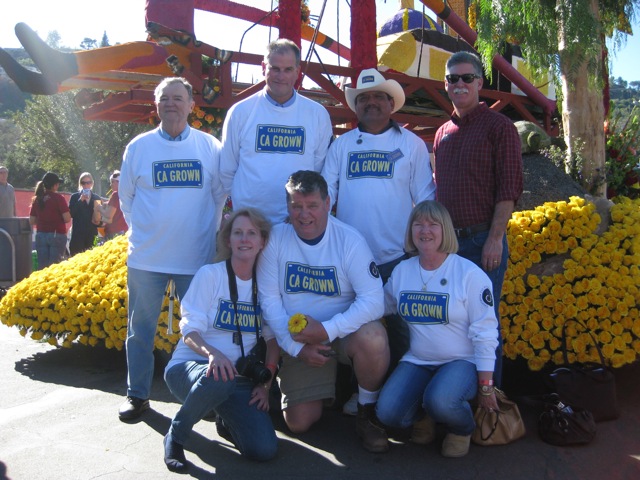Native Flowers Shower Rose Parade
wo Rose Parade Floats Certified as “CA Grown” by California’s Cut Flower Farmers

The oversized cat-shaped clock rising above the float is instantly recognizable. It is a Kit-Cat clock, complete with popping eyes, whiskers upturned over a smile, and, of course, a clock face on its chest. The cat’s coat is made up of black seaweed and onion seeds, and it is accented with white coconut chips. The jukebox below is mostly walnut shells and dried cranberry leaves, and the florescent garden covering much of the floats surface area contains thousands of roses, carnations, and red gerbera. But there is one thing that distinguishes this float from all others in the Rose Parade: everything on it was grown here in California.
The California Department of Agriculture secretary, partnering with farmers from the California Cut Flower Commission, recently certified two floats as “CA Grown” for the first time in Rose Parade history. “This means that 85 percent or more of the flowers used in the float were grown by California farmers,” said Kasey Cronquist, CEO of the California Cut Flower Commission (CCFC). Originally, all Rose Parade floats were adorned with California flowers, but in recent years trade agreements have made it easier for South American farmers to corner the cut flower market. “This is a great event,” Cronquist said. “It’s helping us return to our roots.”
“We reached out to the CCFC to help us achieve our goal of having only CA grown flowers on our float, something we had been told was impossible,” said Woody Young, CEO of Kit-Cat Clocks, whose float was certified before the Rose Parade. “Through our partnership with CCFC and the great effort of our builder, Fiesta Parade Floats, we achieved that goal. CCFC felt it was only right to take the extra step to certify it as CA Grown.’”
Colombian farmers who receive subsidies from the U.S. to help combat the drug trade have proved especially problematic to our local cut flower industry. Now, 75 percent of the cut flowers in the U.S. come from Colombia, posing a major threat to the 10,000 jobs sustained by California’s cut flower industry, not to mention the $5.5 million it channels daily into California’s economy. The Colombian Free Trade Agreement, passed last October without a provision authorizing the Department of Agriculture to build a 200,000 square foot transportation hub for farmers in Carpenteria, the heart of California’s cut flower industry. This proposed depot, supported Lois Capps, was meant to help California farmers compete with their Colombian counterparts. Without it, California’s cut flower industry is in dire straits. The CCFC is doing all it can to promote awareness of this issue, and the “CA Grown” certification is their latest effort to promote local flowers.
Both Cal Poly San Luis Obispo’s Rose Parade entry and the float from Kit-Cat Clocks were given the “CA Grown” certification by CCFC the day before the Rose Parade. “We’re a California company, and we believe that it was only the right thing to do to have California flowers,” Young, who describes himself as a patriot, said in an email. “We’ve been fighting foreign competition with the manufacturing of our clocks because we believe an American icon like Kit-Cat needs to be American Made. In the same way, I felt the iconic Rose Parade needed to have California flowers.”
His sentiments were echoed by Paulina Trujillo, Caly Poly’s Rose Float Decorations Chair, who said, “I feel very accomplished and proud of the float after having been certified. I’ve been working with the CCFC for a long time to make sure that our float was indeed at least 85 percent CA Grown. So it’s good to see all your long, hard work pay off. I’m glad we were able to support the CA Grown movement.”



